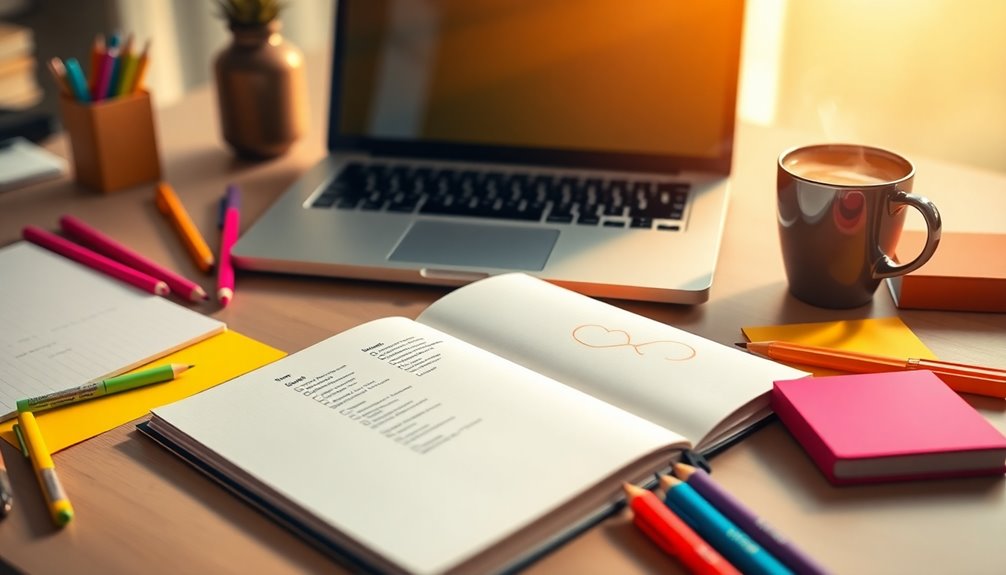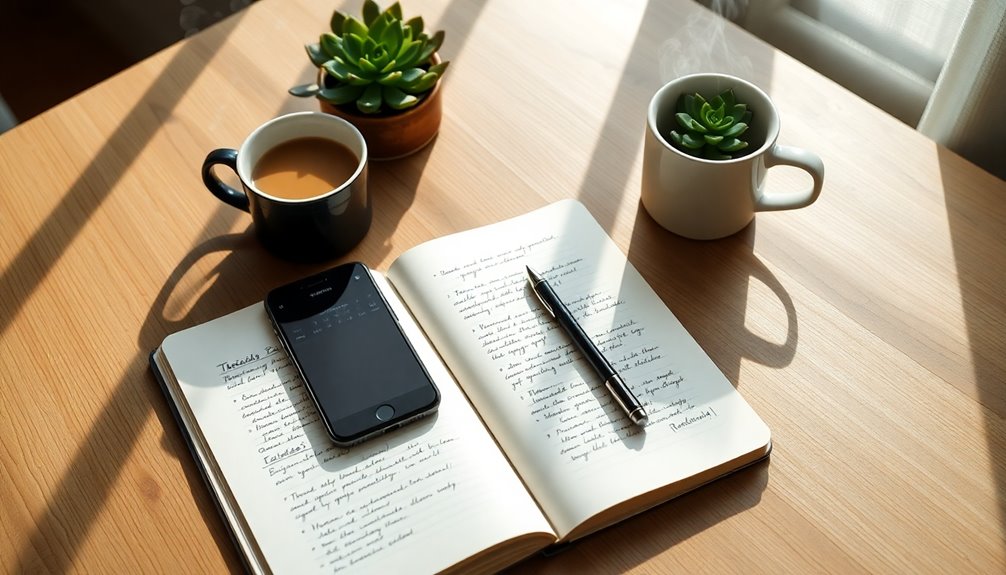Mastering the art of job interviews involves more than just answering questions. It's about showcasing your skills and personality while aligning with the company's culture. Research the organization's values and tailor your responses to highlight your relevant experiences. Practice common questions and provide specific examples that demonstrate your problem-solving abilities. During the interview, listen actively and engage in a conversation to build rapport. Arrive early and dress appropriately to create a positive first impression. With these strategies, you'll boost your confidence and leave a lasting impression—a vital step towards acing your next interview. Explore further tips to enhance your approach!
Key Takeaways
- Research the company's values and culture to tailor your responses effectively during the interview.
- Practice common interview questions and prepare specific examples to demonstrate your problem-solving skills.
- Create a welcoming atmosphere by starting with a friendly greeting and setting clear expectations for the interview flow.
- Engage in active listening to show interest and adapt your questions based on the candidate's responses.
- Provide timely, constructive feedback to candidates, highlighting specific areas for improvement and maintaining transparency throughout the process.
Purpose of Job Interviews

Job interviews serve as a crucial gateway between candidates and employers, offering deeper insights into an applicant's experiences and character. They help you clarify whether your skills align with the company's needs and culture.
During the interview, you can showcase your interpersonal skills and demonstrate how your values sync with the organization's mission. Employers look for candidates who not only possess the required qualifications but also fit well within the team.
Discussing your management style can reveal how you'd contribute to a collaborative work environment. Ultimately, interviews are essential in evaluating mutual compatibility, ensuring both you and the employer can thrive together.
This process lays the foundation for a successful working relationship.
Preparing for Interviews
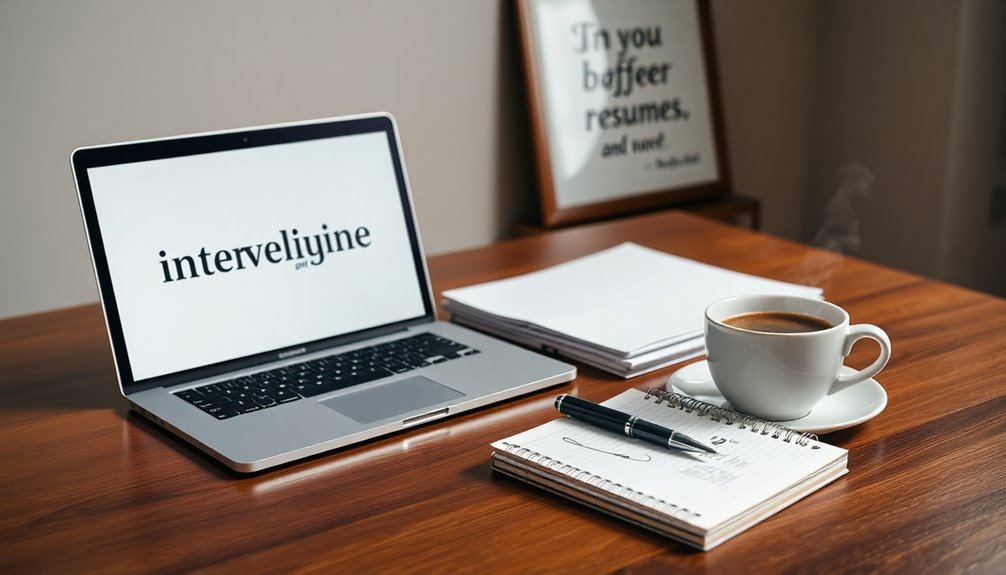
How can you set yourself up for success in an interview? First, research the company thoroughly. Understand its values, culture, and recent developments. Tailor your responses to demonstrate how your skills align with their needs.
Next, practice common interview questions, focusing on your experiences and achievements. Prepare specific examples that showcase your problem-solving abilities and adaptability.
Don't forget to plan your attire—dress appropriately for the company's culture. Arrive early to show punctuality and reduce anxiety.
Also, prepare thoughtful questions to ask the interviewer; this shows your interest and engagement. Finally, practice active listening during the interview to respond effectively. Additionally, understanding filial responsibility laws can help you navigate potential financial obligations that may arise when caring for aging family members, which may affect your job stability.
With these steps, you'll boost your confidence and increase your chances of making a positive impression.
Structuring the Interview

A well-structured interview is essential for evaluating candidates effectively. Begin by defining the attributes and skills you seek in a candidate. Conduct thorough research on each candidate's background so you can tailor your questions accordingly.
Prepare a clear outline of the interview, ensuring you ask appropriate and legal questions. This structure not only keeps the conversation focused but also allows you to maintain a welcoming environment.
Active listening is vital; pay attention to the candidate's responses and adapt your follow-up questions as needed. By creating a structured framework, you foster a more productive dialogue, helping you gather the insights necessary to make informed hiring decisions.
Conducting Effective Interviews

With a clear plan in place, conducting effective interviews becomes a seamless process that fosters genuine connections with candidates.
Start with a friendly greeting to ease any tension. Introduce yourself and other interviewers, outlining their roles to create a comfortable atmosphere.
Setting clear expectations helps candidates understand the interview flow. Use conversational questions to encourage openness and gather valuable insights.
Avoid standard queries; instead, ask behavioral questions that reveal competencies and personal experiences. This approach builds rapport and aligns values.
Listen actively to their responses, as this engagement demonstrates your interest and respect. Additionally, incorporating trust-building activities during the interview process can enhance the candidate's comfort and openness.
Wrapping Up the Interview

Wrapping up the interview effectively is essential for leaving a lasting impression on candidates. Start by summarizing key points discussed, which reinforces your interest in their qualifications. Make certain to outline the next steps in the hiring process, as this shows transparency and professionalism. Thank the candidate for their time and interest, and invite any final questions they may have. Ending on a positive note can leave them feeling valued.
Here's a quick reference table to guarantee you cover all essential points:
| Action | Purpose |
|---|---|
| Summarize key points | Reinforce interest |
| Outline next steps | Guarantee transparency |
| Thank the candidate | Show appreciation |
| Invite final questions | Encourage open dialogue |
| End positively | Leave a lasting impression |
Providing Candidate Feedback
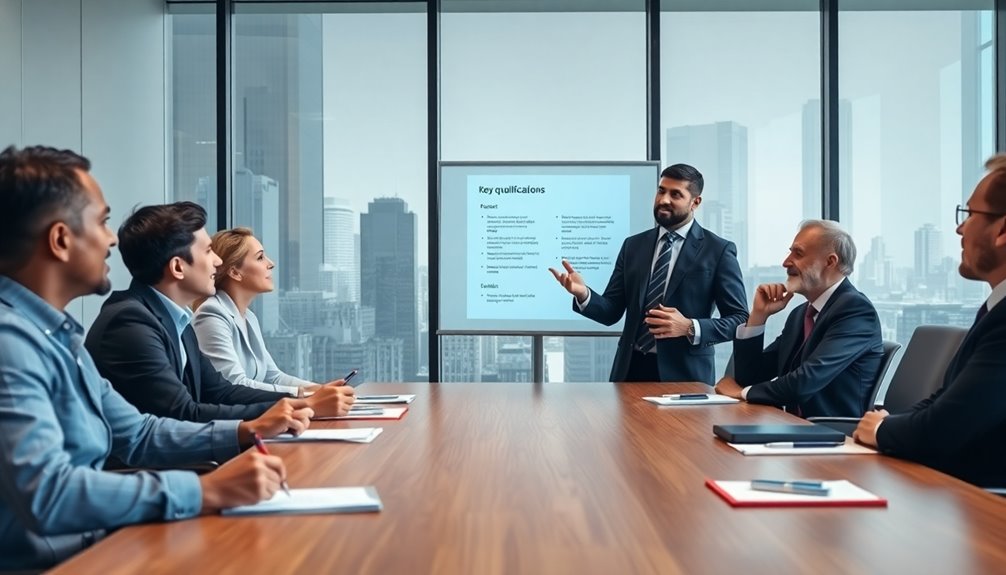
Effective candidate feedback is essential for maintaining a positive relationship with applicants, regardless of the hiring outcome. When you provide timely communication, it shows respect for their time and effort.
If a candidate isn't selected, be direct and constructive in your feedback. Highlight specific skill gaps or areas for improvement, ensuring they understand your reasoning. This transparency not only helps the candidate grow but also leaves a good impression of your company.
Always express gratitude for their interest and participation. Encourage them to reach out with questions about their performance or future opportunities. By fostering this open dialogue, you build goodwill and keep the door open for potential future collaboration.
Enhancing Candidate Engagement
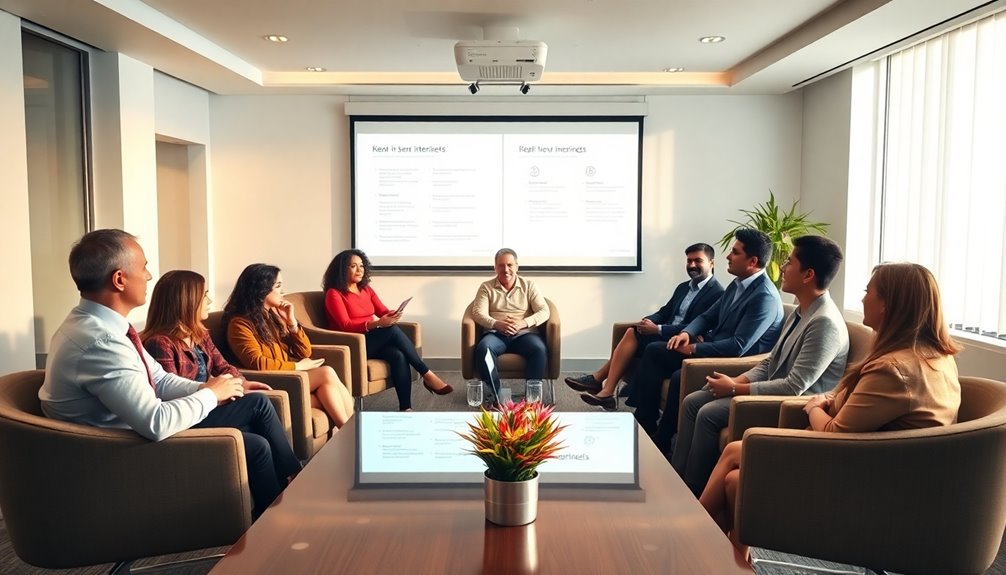
Engaging candidates throughout the hiring process can greatly enhance their experience and perception of your company.
To start, set a welcoming tone during the interview and introduce yourself and your team. Use conversational questions to build rapport and encourage candidates to share their experiences. Make sure you actively listen, showing genuine interest in their responses.
It's essential to provide timely feedback, whether positive or constructive, to keep candidates informed and engaged. After the interview, communicate clearly about next steps and timelines.
Don't forget to thank each candidate for their time and interest, leaving them with a positive impression. By fostering a respectful and engaging environment, you not only attract top talent but also strengthen your employer brand.
Frequently Asked Questions
What Should I Wear to a Job Interview?
When you're deciding what to wear to a job interview, aim for professional and polished attire.
Choose a suit or a tailored outfit that reflects the company's culture. Stick to neutral colors like black, navy, or gray, and guarantee your clothes are clean and pressed.
Don't forget to wear comfortable shoes, as you'll want to feel confident.
Finally, accessorize minimally and keep your grooming neat to leave a positive impression.
How Early Should I Arrive for My Interview?
You should aim to arrive about 10 to 15 minutes early for your interview. This gives you time to settle in and gather your thoughts.
Arriving too early can inconvenience the interviewer, while being late creates a negative first impression. Use this time to review your notes or observe the workplace culture.
It shows you're punctual and respectful of their time, setting a positive tone for the rest of the interview.
Can I Bring Notes to the Interview?
Absolutely, you can bring notes to your interview!
Imagine walking into the room, your notes in hand, ready to share your experiences confidently. Notes can help you recall important points and questions you want to ask.
Just make sure they're organized and concise. You don't want to read directly from them; instead, use them as a guide.
This approach shows you're prepared and engaged, enhancing your chances of making a great impression.
What if I Don't Know the Answer to a Question?
If you don't know the answer to a question, don't panic. It happens to everyone.
You can acknowledge your uncertainty by saying something like, "That's a great question, and I'm not entirely sure."
Then, try to relate it to something similar you do know. This shows your honesty and willingness to learn.
How Do I Follow up After the Interview?
After your interview, think of sending a handwritten note, like a delicate flower blooming after winter's chill.
Express gratitude for the opportunity and mention a specific point from your conversation that resonated with you. Keep it concise, warm, and genuine.
If you haven't heard back in a week or so, don't hesitate to send a polite follow-up email. This shows your enthusiasm and keeps you fresh in their minds.
Conclusion
In mastering the art of job interviews, you've opened the doors to confident communication and compelling connections. By preparing meticulously and presenting your personality, you not only showcase your skills but also build bridges with potential employers. Remember, each interview is a stepping stone, shaping your career story. Stay sincere, stay strategic, and savor the process. With practice and positivity, you'll transform tense situations into triumphant opportunities, landing you the job you desire.


